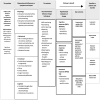A Novel Digital Self-management Intervention for Symptoms of Fatigue, Pain, and Urgency in Inflammatory Bowel Disease: Describing the Process of Development
- PMID: 35583924
- PMCID: PMC9161057
- DOI: 10.2196/33001
A Novel Digital Self-management Intervention for Symptoms of Fatigue, Pain, and Urgency in Inflammatory Bowel Disease: Describing the Process of Development
Abstract
Background: Empirical studies and systematic reviews have demonstrated the role of biological, cognitive, behavioral, and emotional factors in fatigue, pain, and urgency in inflammatory bowel disease (IBD). Behavioral management that addresses the cognitive, behavioral, and emotional factors offered alongside medical treatment is seldom available to people with IBD. Digital interventions provide a potentially scalable and cost-effective way of providing behavioral support to patients.
Objective: This paper aimed to describe the process of developing a supported digital self-management intervention for fatigue, pain, and urgency in IBD using theory and evidence-based approaches and stakeholder input.
Methods: The Medical Research Council framework for complex health interventions and a person-based approach were used to guide intervention development, consulting with 87 patients with IBD and 60 nurses. These frameworks informed the selection and use of a theoretical model that subsequently guided cognitive behaviorally based intervention content. They also guided the design of tailored digital intervention pathways for individuals with IBD that matched the predominant symptoms.
Results: A transsymptomatic cognitive behavioral framework of symptom perpetuation was developed for the symptoms of fatigue, pain, and urgency in IBD. A logic model was used to define the intervention techniques. Patient feedback and qualitative interviews refined the website content and functionalities, including the use of visual aids, email reminders, and graphical tracking of symptoms. Nurse focus groups informed the volume and delivery model of the therapist facilitator support. Ratings of acceptability out of 10 following feasibility testing (31/87, 36%) demonstrated accessibility (scoring 9.43, SD 1.040), ease (scoring 8.07, SD 3.205), clarity, and the relevant tone of the intervention. The final intervention comprised 12 web-based sessions (8 core and 4 symptom-specific), with one 30-minute facilitator phone call following session 1 and subsequent on-site messaging.
Conclusions: The use of theory and integration of stakeholders' views throughout informed the development of an evidence-based digital intervention for fatigue, pain, and urgency in IBD. This is the first web-based self-management intervention designed to address these multiple symptoms with the aim of improving the quality of life and reducing the symptom burden of IBD. The intervention is being tested in a large multicenter randomized controlled trial.
Trial registration: ISRCTN Registry ISRCTN71618461; https://www.isrctn.com/ISRCTN71618461.
Keywords: digital health; inflammatory bowel disease; intervention development; self-management; symptoms.
©Louise Sweeney, Sula Windgassen, Micol Artom, Christine Norton, Sophie Fawson, Rona Moss-Morris. Originally published in JMIR Formative Research (https://formative.jmir.org), 18.05.2022.
Conflict of interest statement
Conflicts of Interest: There is no specific conflict of interest with the product described in this paper. Outside of this submitted work, RMM is a beneficiary of a licence agreement signed between King's College London and Mahana Therapeutics for a digital cognitive behavioral therapy for an irritable bowel syndrome product. She receives personal fees from Mahana Therapeutics for scientific advisory work and from other universities and hospital trusts for cognitive behavioral therapy training in irritable bowel syndrome.
Figures



References
-
- Molodecky NA, Soon IS, Rabi DM, Ghali WA, Ferris M, Chernoff G, Benchimol EI, Panaccione R, Ghosh S, Barkema HW, Kaplan GG. Increasing incidence and prevalence of the inflammatory bowel diseases with time, based on systematic review. Gastroenterology. 2012 Jan;142(1):46–54.e42. doi: 10.1053/j.gastro.2011.10.001.S0016-5085(11)01378-3 - DOI - PubMed
-
- Ng SC, Shi HY, Hamidi N, Underwood FE, Tang W, Benchimol EI, Panaccione R, Ghosh S, Wu JC, Chan FK, Sung JJ, Kaplan GG. Worldwide incidence and prevalence of inflammatory bowel disease in the 21st century: a systematic review of population-based studies. Lancet. 2017 Dec 23;390(10114):2769–78. doi: 10.1016/S0140-6736(17)32448-0.S0140-6736(17)32448-0 - DOI - PubMed
-
- Pillai N, Dusheiko M, Burnand B, Pittet V. A systematic review of cost-effectiveness studies comparing conventional, biological and surgical interventions for inflammatory bowel disease. PLoS One. 2017;12(10):e0185500. doi: 10.1371/journal.pone.0185500. https://dx.plos.org/10.1371/journal.pone.0185500 PONE-D-17-25603 - DOI - DOI - PMC - PubMed
-
- Burisch J, Kiudelis G, Kupcinskas L, Kievit HA, Andersen KW, Andersen V, Salupere R, Pedersen N, Kjeldsen J, D'Incà R, Valpiani D, Schwartz D, Odes S, Olsen J, Nielsen KR, Vegh Z, Lakatos PL, Toca A, Turcan S, Katsanos KH, Christodoulou DK, Fumery M, Gower-Rousseau C, Zammit SC, Ellul P, Eriksson C, Halfvarson J, Magro FJ, Duricova D, Bortlik M, Fernandez A, Hernández V, Myers S, Sebastian S, Oksanen P, Collin P, Goldis A, Misra R, Arebi N, Kaimakliotis IP, Nikuina I, Belousova E, Brinar M, Cukovic-Cavka S, Langholz E, Munkholm P, Epi-IBD group Natural disease course of Crohn's disease during the first 5 years after diagnosis in a European population-based inception cohort: an Epi-IBD study. Gut. 2019 Mar;68(3):423–33. doi: 10.1136/gutjnl-2017-315568.gutjnl-2017-315568 - DOI - PubMed
-
- Farrell D, McCarthy G, Savage E. Self-reported symptom burden in individuals with inflammatory bowel disease. J Crohns Colitis. 2016 Mar;10(3):315–22. doi: 10.1093/ecco-jcc/jjv218. http://europepmc.org/abstract/MED/26598526 jjv218 - DOI - PMC - PubMed
LinkOut - more resources
Full Text Sources
Miscellaneous

